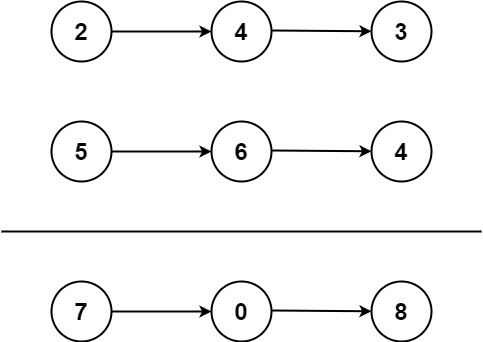Description
You are given two non-empty linked lists representing two non-negative integers. The digits are stored in reverse order, and each of their nodes contains a single digit. Add the two numbers and return the sum as a linked list.
You may assume the two numbers do not contain any leading zero, except the number 0 itself.
Example 1:

Input: l1 = [2,4,3], l2 = [5,6,4] Output: [7,0,8] Explanation: 342 + 465 = 807.
Example 2:
Input: l1 = [0], l2 = [0] Output: [0]
Example 3:
Input: l1 = [9,9,9,9,9,9,9], l2 = [9,9,9,9] Output: [8,9,9,9,0,0,0,1]
Constraints:
- The number of nodes in each linked list is in the range
[1, 100]. 0 <= Node.val <= 9- It is guaranteed that the list represents a number that does not have leading zeros.
Code
一開始寫了個又臭又長的版本。
/**
* Definition for singly-linked list.
* struct ListNode {
* int val;
* ListNode *next;
* ListNode() : val(0), next(nullptr) {}
* ListNode(int x) : val(x), next(nullptr) {}
* ListNode(int x, ListNode *next) : val(x), next(next) {}
* };
*/
class Solution {
public:
ListNode* addTwoNumbers(ListNode* l1, ListNode* l2) {
int carry = 0;
ListNode dummy(0);
ListNode* curr = &dummy;
while(l1 && l2) {
int val = (l1->val + l2->val + carry) % 10;
curr->next = new ListNode(val);
carry = (l1->val + l2->val + carry) / 10;
curr = curr->next;
l1 = l1->next;
l2 = l2->next;
}
while(l1) {
int val = (l1->val + carry) % 10;
curr->next = new ListNode(val);
carry = (l1->val + carry) / 10;
curr = curr->next;
l1 = l1->next;
}
while(l2) {
int val = (l2->val + carry) % 10;
curr->next = new ListNode(val);
carry = (l2->val + carry) / 10;
curr = curr->next;
l2 = l2->next;
}
if(carry) {
curr->next = new ListNode(carry);
}
return dummy.next;
}
};while 迴圈改用 or 就可以將 code 變簡潔。
/**
* Definition for singly-linked list.
* struct ListNode {
* int val;
* struct ListNode *next;
* };
*/
struct ListNode* addTwoNumbers(struct ListNode* l1, struct ListNode* l2) {
int carry = 0;
struct ListNode* dummy = (struct ListNode*) malloc(sizeof(struct ListNode));
dummy->next = NULL;
struct ListNode* cur = dummy;
while(l1 || l2 || carry) {
int sum = 0;
if(l1) {
sum += l1->val;
l1 = l1->next;
}
if(l2) {
sum += l2->val;
l2 = l2->next;
}
sum += carry;
carry = sum / 10;
struct ListNode* new_node = (struct ListNode*) malloc(sizeof(struct ListNode));
new_node->val = sum % 10;
new_node->next = NULL;
cur->next = new_node;
cur = cur->next;
}
return dummy->next;
}/**
* Definition for singly-linked list.
* struct ListNode {
* int val;
* ListNode *next;
* ListNode() : val(0), next(nullptr) {}
* ListNode(int x) : val(x), next(nullptr) {}
* ListNode(int x, ListNode *next) : val(x), next(next) {}
* };
*/
class Solution {
public:
ListNode* addTwoNumbers(ListNode* l1, ListNode* l2) {
int carry = 0;
ListNode dummy(0);
ListNode* curr = &dummy;
while(l1 || l2 || carry) {
int sum = 0;
if(l1) {
sum += l1->val;
l1 = l1->next;
}
if(l2) {
sum += l2->val;
l2 = l2->next;
}
sum += carry;
curr->next = new ListNode(sum % 10);
carry = sum / 10;
curr = curr->next;
}
return dummy.next;
}
};